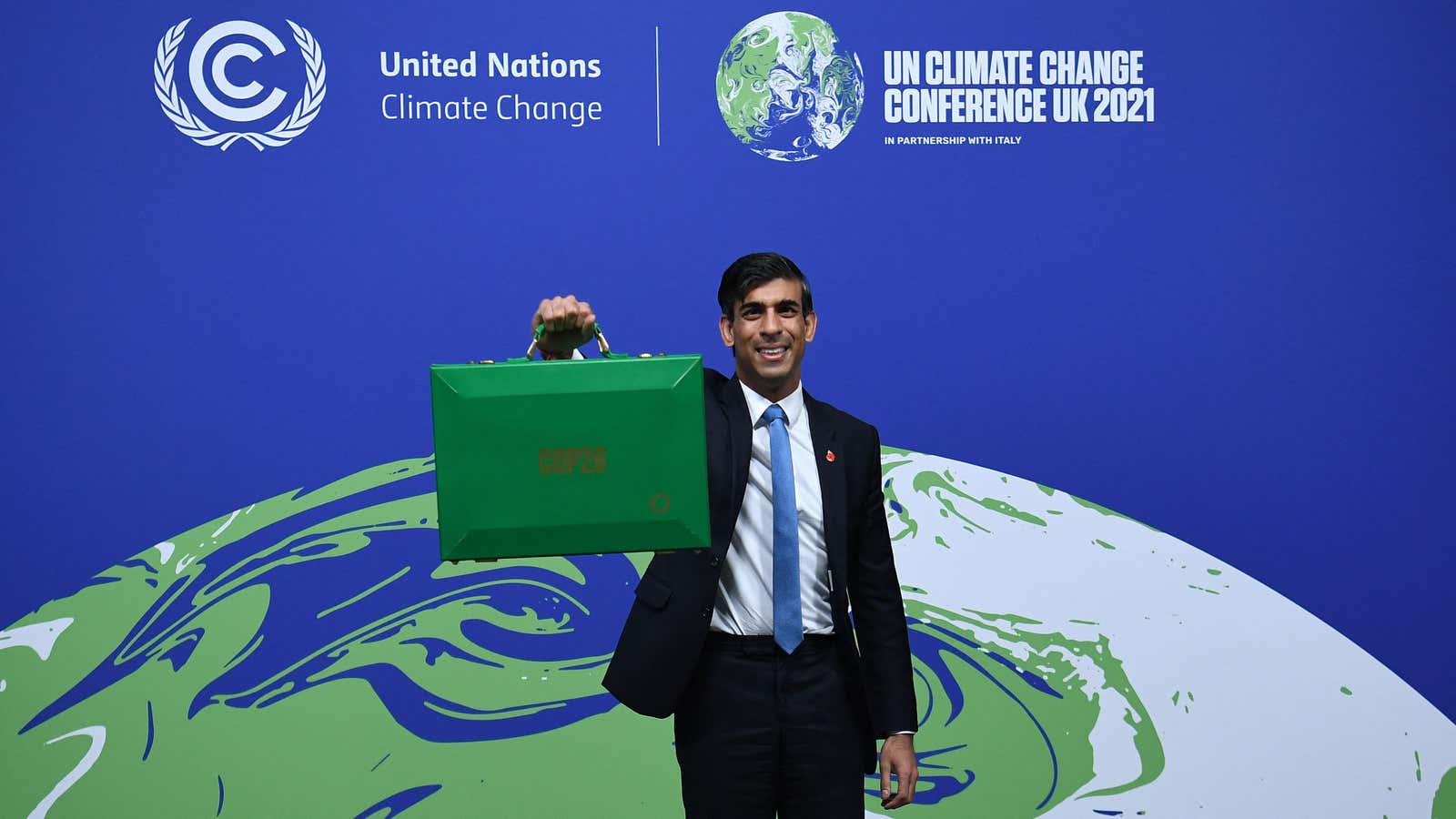Hi Quartz readers,
COP26 just wrapped up its third day, and the focus was on finance. But first, here’s what’s happened at the summit so far:
- Ending deforestation: More than 100 countries signed a pledge to end deforestation by 2030, and a group of asset managers with $8.7 trillion under management committed to purging commodities-linked deforestation from their portfolios by 2025.
- Modi makes a promise: India committed to its first net-zero target; the country pledged to be carbon neutral by 2070. The promise, however, falls short of a COP26 hope for countries to carry out that target by 2050.
- Methane gets its moment: Led by the US, more than 100 countries signed an agreement to cut methane emissions 30% below 2020 levels by 2030 (China, India, and Russia were not among them). Curbing methane is widely seen as the lowest-hanging fruit for climate.
- A COP apology: The event has seen hour-long lines into the venue, a faulty virtual conference platform, and delegates turned away, including a wheelchair-using minister unable to enter the site. Organizers sent a contrite email calling it “a learning process.”
By the digits
105: Signatories to the Global Methane Pledge, including Brazil, covering 50% of global methane emissions
$900/ton: Price of leaked methane to be paid by the largest US energy companies, starting in 2024
$8.5 billion: Amount South Africa will receive to help end its reliance on coal
450+: Financial institutions with a commitment to net-zero greenhouse gas emissions
$19.2 billion: Amount pledged to halt and reverse forest loss
$4.13 trillion: Climate finance needed by 2030 in order to limit global warming to 1.5ºC
Finance tries to turn its money green
COP26 is nominally about reducing carbon emissions, but in practice it’s largely about cash—and so far, there’s not nearly enough.
In the first two days of the summit several rich countries promised to deliver more climate finance to poorer countries to support clean energy and climate adaptation. These commitments get the world close to the long-sought public finance goal of $100 billion, US climate envoy John Kerry said.
But the big number dominating the summit was $130 trillion. That’s the value of assets held by 450 global financial institutions that have committed to net zero emissions targets as part of the Glasgow Financial Alliance for Net Zero (GFANZ), up 25 times compared to just a year ago.
Theoretically, institutions from banks to insurers have enormous power to push companies to embrace decarbonization goals. In practice, that’s happening slowly, if at all in most sectors.
Today, there’s little agreement across the financial sector on what targets should entail, and how to measure them. And members of GFANZ aren’t required to stop financing fossil fuels. In fact, private banks are investing more (pdf) in fossil fuels than when the Paris Agreement was signed in 2015.
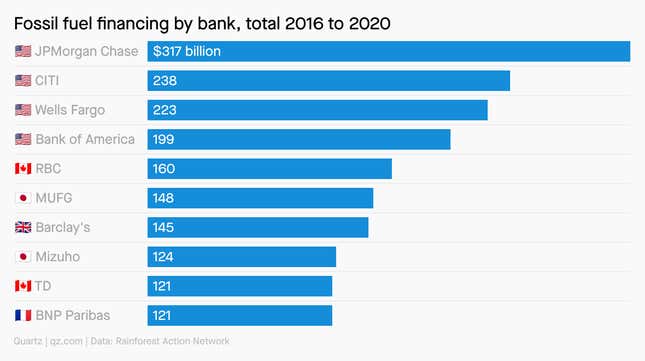
The $130 trillion figure also overstates how much money is actually targeted at net-zero emissions: only a portion of most asset managers’ investment portfolios includes the target. That gives institutions cover to greenwash, said Amanda Starbuck, investor program director for Australian activist group The Sunrise Project. In the absence of international regulation, financiers will need to hold themselves to a higher standard, she said: “Asset managers who really are trying to do more should be shouting that they don’t want to be on the same press release as this BS.”
Quotable
“In the past we could know who said what and shine a light on any laggards. But now we’re not in the room to hear what’s happening.” —Mohamed Adow, director of Power Shift Africa, on civil society groups facing limited access to COP26 negotiations because of pandemic restrictions.
Brazil is failing the Amazon
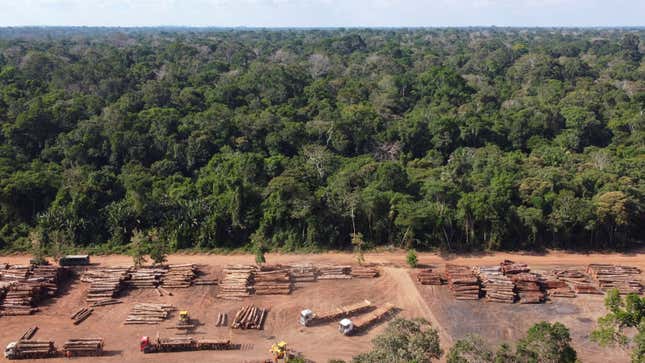
At the start of COP26, world leaders promised to stop deforestation by 2030. Although similar pledges have faltered in the past, this one will include more than $19 billion of public and private funds, and is backed by Brazil itself.
It’s about time: Almost 20% of all-time recorded destruction of protected areas in the Amazon happened between 2019 and 2020.
A recent report by Brazilian non-governmental organizations found nearly half a million hectares were deforested in the Amazon rainforest between 2019 and 2020, an area three times the size of São Paulo.
Quartz members enjoy a paywall-free experience of all our articles. Readers of this email can get 40% off an annual membership with the code COP26.
This is (not) fine
The world’s top climate scientists are skeptical we will keep the world from catastrophic warming. A survey in Nature asked the authors of the most-recent IPCC report if warming will be limited to the Paris Agreement goal of 1.5-2ºC. Sixty percent of respondents said they expect the world to warm by at least 3ºC.
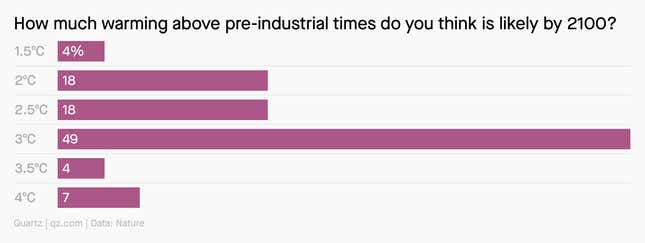
👀 what’s next
🌳 Article 6 negotiations: With most heads of state now gone from Glasgow, the real negotiating work can begin, including on rules for global carbon markets. Tensions are emerging over whether a share of proceeds from international carbon transactions should be diverted into a fund for adaptation.
🚢 Fixing shipping: On Friday, executives from Maersk and other major shipping companies will meet in Glasgow to discuss how to resolve the sector’s giant carbon footprint.
⚫️ Powering past coal: South Africa already announced an $8.5 billion deal to wind down its heavy reliance on coal. On Nov. 4, energy ministers from Europe, Asia, and South America will meet to discuss how other countries could follow suit. Setting a deadline to phase out coal globally is a key objective of the COP26 organizers.
One 🧱 thing
Ahead of COP26, Lego released some guidance for grown-ups called “Building Instructions for a Better World.” Developed in consultation with over 6,000 children, the instruction booklet includes simple directives like “educate people” and “invest in the environment.” It will be distributed to policy makers at the climate summit in Glasgow.
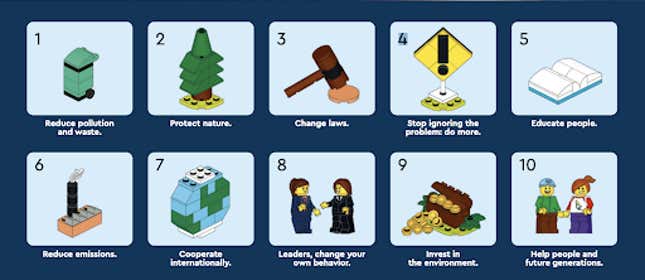
Keep learning
- The first global carbon market could be a gamechanger for the climate, if COP26 can make it work
- Cities are showing off local climate innovations at COP26
- African leaders demanded wealthy countries make good on their $100 billion climate finance pledge
- This is how the Federal Reserve will confront climate change
- How satellites are finding the world’s hidden greenhouse gas emissions
- The G20 agreement on financing coal says nothing about the private sector
Our best wishes for a net-zero day. Get in touch with us at needtoknow@qz.com and live your best Quartz life by downloading our iOS app and becoming a member. Today’s email was brought to you by Tim McDonnell, Amanda Shendruk, Clarisa Diaz, Michael Coren, and Liz Webber.
